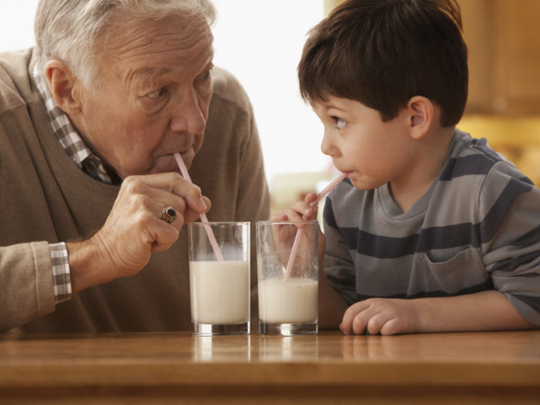
If there was ever a food one would bet on to be controversy- and risk-free, many would go for milk. But sadly that is not the case.
Milk, for all its goodness, has also given rise to many debates, the most recent being the raging polemic on raw milk, with one camp firmly believing that it not only tastes better but is better for you than pasteurised milk, and the other seeing it as dangerous and full of disease-causing elements.
Thanks to the media and popular culture milk continues to enjoy a status that is almost iconic. It is touted as the elixir of life that cures everything from weak bones to insomnia. Actress Salma Hayek has proudly sported a milk moustache for the Breakfast Project along with a host of celebrities, from the cast of popular sitcom Modern Family to actor Taye Diggs, who all believe that drinking milk is the perfect start to any day.
And then there are those who believe that milk should not be consumed by adult humans as we have lost the ability to digest it.
Milk has always been packaged with cultural, religious and societal undertones. For instance, most Indians of a certain age will recall the White Revolution, the story of how dairy major Amul drove the success of Operation Flood. The world’s biggest dairy development programme, it transformed India from a milk-deficient nation to the largest milk producer in the world.
But despite the immense popularity and cultural acceptance that milk and milk products enjoy, there is no escaping the evidence that suggests there could be more to this wonder drink than meets the eye.
GN Focus brings together a panel of UAE-based doctors that includes Dr Nabeela Shafqat, Clinical Nutritionist, Canadian Hospital, Dr Brenda Saunders, Homeopath, The Dubai Herbal and Treatment Centre, Ashwini Vidhate, Dietician, Panacea Medical & Wellness Centre, Dr Mohammad Maki, GP, Canadian Hospital, and Dr K.R. Menon, Paediatrician at Panacea Medical & Wellness Centre, to present a healthy discussion on some common myths and issues surrounding milk.
Prevent Osteoporosis
Osteoporosis is a condition that affects the bones, causing them to become weak and fragile (pictured above), and makes them more likely to break or fracture.
The proponents of milk believe that increased calcium intake — particularly in the form of the currently recommended three glasses of milk per day — will help prevent osteoporosis. On the other hand, studies show that high levels of galactose, a sugar released by the digestion of lactose in milk, can possibly damage the ovaries, leading to ovarian cancer.
Dr Mohammad Maki: It is recommended for men to take three glasses of milk a day, as it helps fight prostate cancer and colon cancer. However, what happens in women is that the lactase enzyme in the body breaks up the sugars in milk, which studies now show could lead to the sugar damaging their ovaries, which may, in time, lead to ovarian cancer. However, this can all be avoided by drinking low-fat milk and consuming low-fat dairy products, because these dairy products have decreased levels of sugars and fats and do not damage the ovaries.
Dr Nabeela Shafqat: First of all, we do not recommend people drink three glasses of milk a day. There are many alternative sources of calcium instead of milk, such as yoghurt, broccoli and orange juice. Ovarian cancer is only linked to the intake of milk in a few studies, and these studies do not correlate the intake of milk to ovarian problems but rather to the fat saturation in the milk.
Best source of calcium?
Humans are the only mammals which drink milk after the weaning period and consume milk of other animals. Studies show that other mammals lose their ability to digest milk once they stop consuming their mother’s milk. Is it then right that we continue to drink cow’s milk? And what about other dairy products, are they harmful as well?
Dr Brenda Saunders: Milk is one source of calcium (pictured above) but by no means the best. Better food sources include sesame seeds, with five times more calcium, and sardines and Nori seaweed, which offer triple the amount. A growing body of evidence suggests commercial cow’s milk can in fact be detrimental if not hazardous to health. Pasteurised and homogenised milk can become an acid-forming food as it has a positive potential renal acid load, which causes calcium to be leeched from bones in order to maintain an ideal body pH. Also, though humans manufacture the enzyme lactase to digest sugars from dairy, in many cases this is inadequate. It leads to lactose intolerance that can result in mild to severe digestive symptoms.
Dr K.R. Menon: After the weaning period, milk and dairy products are necessary to provide nutrients such as calcium for growing bones and teeth in young children. Cow’s milk is a good source though not the only one. Humans need 1,000-1,300mg of calcium a day and only if a person is lactose intolerant or allergic should they avoid dairy products.
Anaemia in children
There are cases where children who have had too much milk have developed severe anaemia, a condition where the amount of haemoglobin in the blood is below normal levels. There are several different types and each has a different cause, but iron deficiency anaemia (pictured above) is the most common. While milk is a good source of calcium, it can deplete the iron in our bodies. How much milk is then too much?
Dr Nabeela Shafqat: Children at two years old shouldn’t drink more than 24 ounces of milk. For children under two years of age, breastfeeding is very important, as it provides them with all the nutrients and is a great source of iron. If mothers will not breastfeed then we usually suggest formulas that include iron. We see anaemia or iron deficiency to be common among children who drink more than 24 ounces of milk a day. Milk decreases the absorption of iron in the intestines. It is a poor source of iron itself and its iron bio availability is not 100 per cent, which is why children who have too much milk suffer from iron deficiencies.
Dr Mohammad Maki: What happens with children, especially at a young age, is that they find it easy to drink milk for meals and it is convenient for parents as well. Children who drink a lot of milk usually do not eat other food and this causes a deficiency of iron. Those who drink more than four glasses a day are usually the ones who have iron deficiency. If tests show children have this deficiency, we advise the parents to decrease the amount of milk.
Impact of hormones
And finally, cows fed with genetically modified grain, pumped up with antibiotics and hormones, and kept in inhumane conditions produce commercial milk that is often considered unhealthy for consumption. Devoid of nutrients and taste, how good is this milk for us? Is it just an ordinary food product that has received a lot of hype because of big dairy businesses or is it truly a super food?
Ashwini Vidhate: Growth hormones may affect the health of the cows in question, but they do not have any adverse effect on the nutritional quality of the milk produced by them. Milk is rich in many nutrients such as calcium, protein, vitamin A, vitamin B 12, riboflavin and phosphorous. Therefore, it is indeed good for us. We can consider low-fat milk as wholesome food as it also contains some amount of carbohydrates and a minimal amount of fat.
Dr Brenda Saunders: It was in 1993 that the FDA approved a controversial genetically engineered hormone, RBGH, for use in dairy farming. This hormone is injected into cows to increase their milk production and many animal health problems have been caused because of this.
Not just that, commercial milk also contains traces of antibiotics as well as this genetically engineered bovine growth hormone. These hormones have been shown to increase blood levels of insulin growth factor 1. High levels of this hormone have been linked to several cancers as well.












